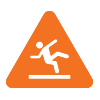Loss Control / Risk Management
For our clients, the best way to protect their business is very rarely just an insurance policy. Proactive risk management is an important step to minimize exposures and safeguard assets before a loss occurs.
Parker, Smith & Feek’s approach to risk control is to implement a collection of methods to identify and correct the fundamental and underlying causes of loss. An effective risk management program will improve organizational safety, contribute to a healthier workforce, decrease claim frequency and severity, and reduce the total cost of risk. Our practical experience has shown that successful measures can be as simple as providing safety goggles to machine operators or as complex as designing comprehensive programs for large companies with myriad operations across states and countries.
We have a dedicated loss control team of specialists in environmental, property, and healthcare liability issues to ensure that our recommendations are tailored to the specific industry exposures faced by our clients. Additionally, Parker, Smith & Feek offers a web-based platform, The Risk Management Center, to help clients develop and manage safety and risk management programs free of charge.
Loss prevention and safety service offerings include:
- Risk management program review
- Insurance company loss control activities review
- Insurance company recommendations implementation guidelines
- Workplace safety program development
- Fleet safety and driver training program development
- Hazard recognition surveys
- Environmental liability risk control options
- Basic information on crisis/disaster planning
- Fire protection systems installation consultation
Healthcare-specific risk management service offerings include:
- Proactive risk assessments of operations and high-risk service lines
- Organizational policy and procedure review and development
- Research into risk management best practices and guidelines
- Day-to-day operational guidance on quality and patient safety practices
- Tailored staff training and education on various risk issues/topics, e.g., informed consent/refusal, release of information, disclosure, etc.
- Quarterly publications through articles and vlogs on emerging healthcare risks and trends
- Process improvement training and facilitation using lean management methods
- Development of reports for corporate leadership and board members
- Claims analysis and risk mitigation strategy development
- Coordination of risk management services available through insurance carriers
- Sharing and spreading of changes to regulatory standards and local/federal laws impacting healthcare delivery


